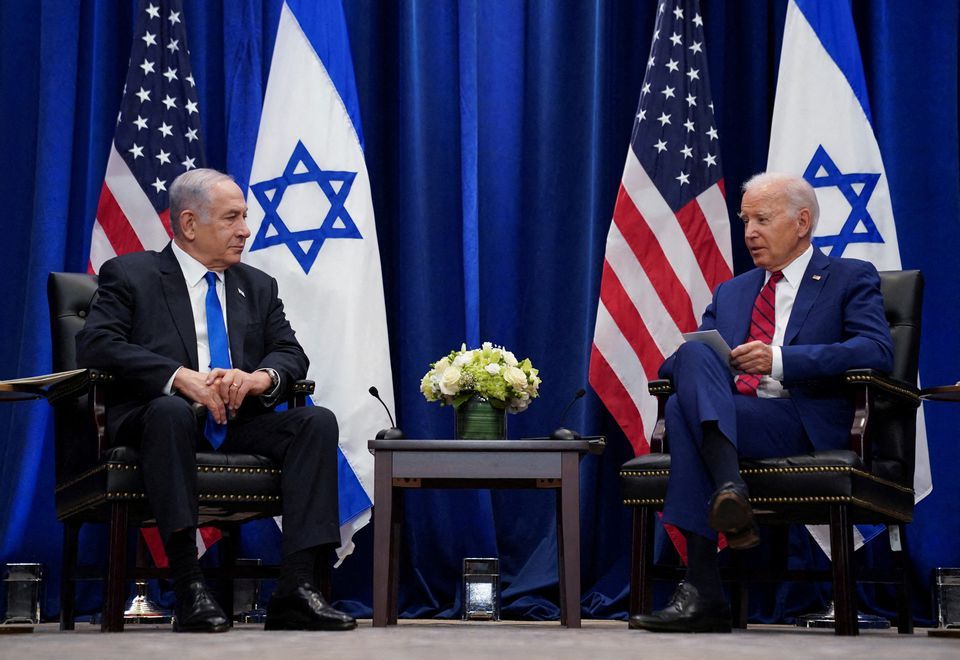Biden's trip to Israel would have security and political risks

U.S. President Joe Biden's administration finds itself at a pivotal juncture, grappling with complex security and political challenges as it considers a potential visit to Israel. The invitation, extended by Israeli Prime Minister Benjamin Netanyahu, carries significant implications as the Middle East navigates precarious regional dynamics. This article delves into the intricacies of this potential visit and its broader diplomatic significance.
Section 1: The Invitation and the Risks
The groundwork for President Biden's potential visit to Israel was laid by Prime Minister Netanyahu, who extended the invitation. The invitation comes in the wake of a devastating cross-border assault by Palestinian Hamas militants on October 7th, leading to significant Israeli casualties. While the White House remains tight-lipped about any concrete plans for the trip, discussions between U.S. and Israeli officials are reportedly ongoing.

Section 2: Balancing Act in a Volatile Region
President Biden's visit to Israel would signal unwavering American support for Prime Minister Netanyahu. However, the backdrop against which this visit is contemplated is anything but stable. The U.S. seeks to prevent a more extensive regional conflict that could involve Iran, its Lebanese ally Hezbollah, and Syria. Furthermore, the humanitarian situation in Gaza has deteriorated significantly, with over 2,800 casualties due to Israeli attacks.
A potential visit to Israel offers President Biden an opportunity to influence the ongoing developments in the region while bolstering his image domestically.
Section 3: Critical Talks and Unique Security Challenges
A face-to-face meeting between the U.S. President and the Israeli Prime Minister provides a platform for private discussions on critical matters. Key among these is the looming prospect of an Israeli ground invasion in Gaza. Experts emphasize that President Biden needs to underscore the global reputation at stake and the potential consequences of an occupation of Gaza.
The presence of U.S. Secretary of State Antony Blinken in Israel for meetings has underscored the unique security challenges in the region. During one such meeting, sirens blared in Tel Aviv, forcing both leaders to take shelter for five minutes.
Biden's possible visit to Israel
- The visit is planned amidst a tumultuous regional context, with Israel preparing for a ground offensive in Gaza and missile exchanges occurring with neighboring countries.
- President Biden has made efforts to condemn anti-Jewish hate crimes, but his domestic stance on the conflict remains polarized.
- The visit, if it occurs, will mark another significant diplomatic move in President Biden's longstanding relationship with Israel.
- Discussions are expected to cover a wide array of topics, including regional stability and the humanitarian crisis in Gaza.
- The unique security challenges faced by President Biden and U.S. Secretary of State Antony Blinken during their visits highlight the volatility of the situation.
- The potential visit signals American support for Prime Minister Netanyahu at a time when the U.S. aims to prevent a broader regional war involving Iran and its allies.
Section 4: A Delicate Time for Visits
Adding to the complexity of the situation is Israel's preparation for a ground offensive in Gaza. Such an offensive is anticipated to exacerbate the humanitarian crisis in the region. Concurrently, missile exchanges between Lebanon and Israel, along with a nationwide need for shelter from Hamas-fired missiles, paint a grim picture of the regional security landscape.
Section 5: The Domestic Landscape
President Biden's actions at home are closely intertwined with his foreign policy decisions. A rise in anti-Jewish hate crimes has prompted the President to condemn such actions during phone conversations with foreign leaders. Despite his efforts, President Biden's stance has been marked by divided American public opinion.
The President faces the challenge of striking a balance between supporting Israel's response to Hamas attacks and expressing humanitarian concerns for Palestinians affected by the Israeli military offensive.
Section 6: Diplomatic Moves
Historically, President Biden's visits to Israel have held significant diplomatic importance. This visit, if it materializes, could offer an opportunity for the President to empathize with Israel's perspective and influence its course of action. Additionally, President Biden could use the visit to hold discussions with Palestinian Authority President Mahmoud Abbas in the West Bank, as he did during his prior visit to Israel in the last year of his presidency.
